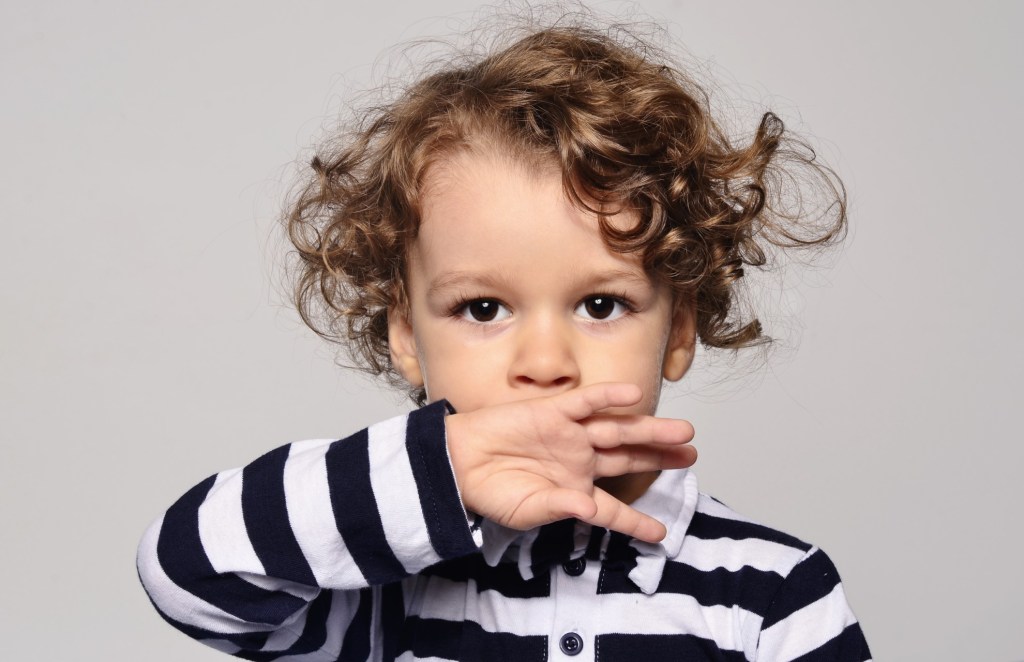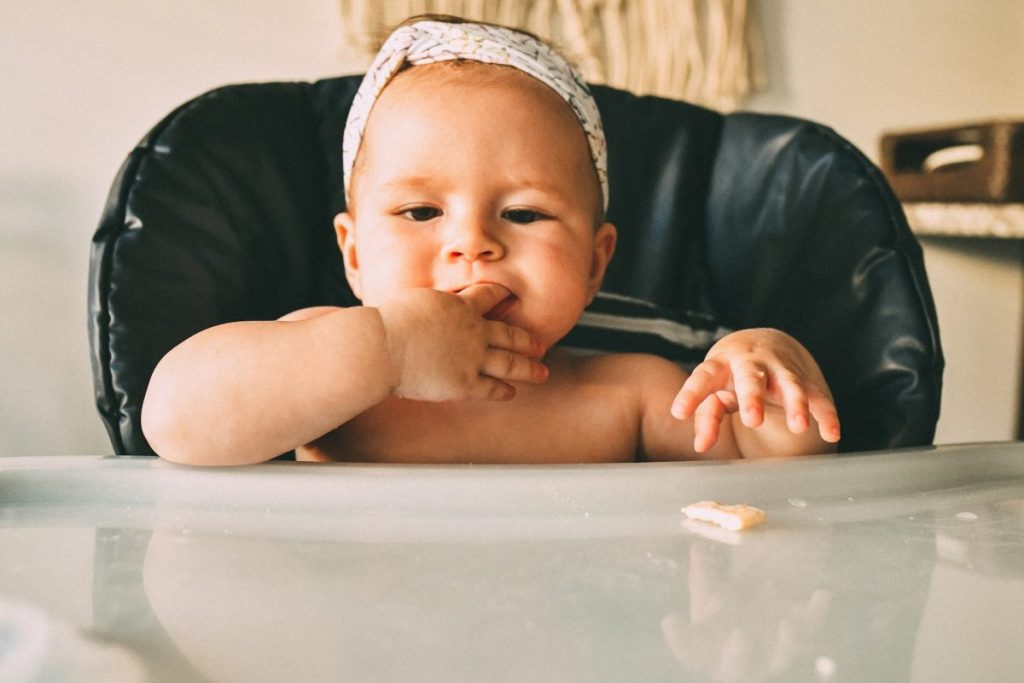Babies love to explore, and one way they do that is by putting things in their mouths. From toys to their own hands, and of course, sucking their thumbs, it seems like babies are always putting something in their mouths. If your baby is sucking on their hand, it’s not that uncommon. According to Stanford Children’s Health, about 90% of newborns show some form of hand sucking as quickly as two hours after birth. It’s a perfectly normal and common behavior in babies.
But what makes your little one favor their hand? There are many reasons your baby prefers to suckle on their hands. Let’s find out why your precious peanut won’t keep their hand out of their mouth and if any of those should make you try to break their habit.
It could be a hunger cue

Newborns and infants seem to be constantly hungry. Putting their hands to their mouths is one of many hunger cues for babies. It’s actually first in the CDC’s list of hunger cues for babies zero to five months old, followed by turning head to breast or bottle, smacking or licking lips, and clenching hands.
Suckling is a natural instinct for babies, and the first thing you should check for if you see them doing this is if they are hungry. Whenever they drink milk, they are suckling, so when they feel hungry, they start sucking on the only thing available to them — which is usually their hand.
Think about when your baby last ate to clue you into if your baby sucking on their hand is a hunger cue. Don’t feed your baby immediately every time they chew on their hands though, since there are a few other things this behavior could be indicating. But babies are always hungry, so this should be your go-to to check for first.
Other reasons why your baby favors their hand

If you do want to try getting your baby to stop putting their hands in their mouth, it’s a good idea to know why they are doing it in the first place. If your child is fed, check for these other potential possibilities.
Self-soothing
Another reason babies suck on their hands is they use this as a self-soothing method. It’s like using their fingers as a pacifier. Sucking is one of the most soothing reflexes for babies since it’s associated with feeding. This action is relaxing and comforting mentally and physically for them. They feel safe and satisfied after being fed — don’t we all — and they often start practicing this reflex in utero, so it feels familiar.
Teething
As young as four months old, babies may chew on their hands because they are starting to teethe. Yes, that early. As teeth start to move down toward the gums, chewing puts counter-pressure against the sore gums. If your baby doesn’t have a teething toy handy, they’ll use their hand as one. Offer silicone teething toys that have been in the refrigerator as a handy alternative for painful gum relief.
Boredom
Besides hunger, self-soothing, and teething, babies might eat their hands simply out of boredom. If they have nothing around them to do or hold, their hands are the next best thing to a toy. We all know an adult who idly bites their nails, so some of us never really grow out of this habit.
First-time discovery
They also might be excited that they’ve discovered their hands for the first time and want to experiment with them. You may notice them find their feet at some point, too, and even put their feet in their mouth. It looks way more adorable than it sounds, we promise. Your little one just wants to check these new things out, and that includes a taste test of their hands.
When you should keep an eye on it

If your child is getting sick
Not everything a kid puts in their mouth is clean, we know this. If you notice your child becoming sick more than usual, it might be the quality time they are having with their hands. Offer snacks (if they are old enough), acceptable toys (that are clean), or pacifiers (if you are okay with those) to reduce the time your child has their hands in their mouth. This will tone down the bacteria getting in their system and reduce their time being sick.
If your child is teething: Check in their mouth
If your little one is self-soothing because of a tooth coming in, check things out in there. Once you find the bump where the tooth is coming in, check it over. When your child is getting teeth in, if they are sucking on their hands excessively, it could potentially affect where the teeth are going to come in. This could lead to crooked teeth or messing with the spacing between the teeth. Your baby could also cut their finger on an erupted tooth, which won’t feel good, either.
When it might be something to get checked out

With the normal ones out of the way, there are a few reasons why your baby sucking on their hand you want to keep in the back of your head. We have to tick all of the boxes, so look for these things with your child.
- They could be stressed.
- There’s a wound in their mouth.
- There could be something stuck in their mouth.
- If your child is older than four years old, talk to the pediatrician.
If your tot has a small wound in their mouth, the sucking could make it feel better, but it could also make it worse. There could also be something in their mouth they can’t get out. We know how babies will taste test anything, so see if they have something caught in their mouth that shouldn’t be there.
Pediatricians and dentists say not to worry about this habit until they are at least toddlers, so your baby should be fine. Your baby is going to put things in their mouth anyway, so it might as well be their own hand. They often naturally grow out of it and it’s a typical developmental stage.
But once your child is four years old, they should be done with sucking on their hand. If your kiddo is older and it worries you that they still do it, consult with the pediatrician. Of course, if you feel the chewing is at all excessive and are concerned, check with your child’s doctor.
How it can be beneficial

If your baby is sucking on their hands, it’s not always something to worry about, and can even be beneficial to them. Experts suggest that sucking on their hands actually helps alleviate any stress your baby may be experiencing, helping them calm down, and is a very common activity for children between the ages of 2 and 5. As they get older they will naturally outgrow the habit.
Another benefit is that by sucking on their hands babies are getting exposed to those everyday germs they naturally encounter and therefore help to build their immune system naturally. This has even been shown to help reduce allergies as they grow older.
Take care of those baby hands

- Trim their nails.
- Wash their hands often.
- Opt for drooling bandanas.
While your baby is in their hand-eating stage, make sure you keep their hands clean and their nails trimmed, so they aren’t putting themselves in any risky bacteria situations or scratching their face or the inside of their mouth up. Your baby sure isn’t going to care how dirty their hands are, so parents will need to keep them clean.
Since drooling often goes hand in hand with this behavior, consider getting drool bandanas, so your baby isn’t sitting in soggy clothes, and you don’t have to change their outfits so often.
Some kids are thumb suckers, some chew on their clothing, and some can’t keep their pudgy hands out of their mouths. It’s all a part of being a baby and learning the ropes of life. Parents should know this behavior is common, and normal, and just means your baby is a regular baby doing regular baby things.




